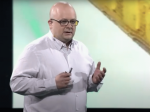 Amazon
Amazon
Amazon's VP of Robotics and distinguished engineer Brad Porter, who suddenly resigned last month, left after the company denied his request for a better pay structure.
Porter wanted the pay range for his position to expand beyond what the company had set previously, according to people familiar with the matter. While other factors, like the allure of working for a richly valued startup and moving back to the Bay Area where his family lives, were important motivators, Porter's failure to adjust his compensation structure at Amazon also played a role in his departure, these people said.
Once Amazon refused to match his request, Porter accepted the offer from Scale AI, an artificial intelligence startup based in San Francisco, one of the people said. Porter announced his move on Monday.
Amazon's representative didn't provide a comment for this story. In an email to Business Insider, Porter didn't address the specific compensation issue, saying his decision was mainly driven by family and the work at Scale AI.
"My family and I have been contemplating a move back to the Bay Area as my wife's family is there," Porter said in a statement. "We decided to take this unique opportunity to join an amazing high-growth startup in Scale AI."
Porter's case reflects Silicon Valley's intensifying competition for talent, as more startups look to poach longtime Amazon executives with lucrative offers. But it also gives a rare look into how Amazon's unusual compensation structure could get frustrating, current and former employees say.
'Underwhelmed'Amazon's pay is composed of two factors: a base salary that largely caps at $160,000 per year, and a stock grant which is given within a specific range for each position. Since the base salary can't go above $160,000 a year, most employees expect pay upside in their stock grants.
All new employees get a total compensation target plan which maps out their anticipated pay for the next two to five years.
But things can get tricky because of Amazon's soaring stock price. For example, when you get promoted, you would expect to receive new shares on top of what you were promised when you first joined. However, if your previously set compensation plan ends up exceeding the pay range for your new position, due to the exponential rise in Amazon's stock price, the company won't give you any new shares.
In other words, employees who were set to make $100,000 in stock grants in the fourth year may not get any additional shares for their promotion, if the value of those stocks have appreciated beyond the pay range of their new positions.
Zaheer Mohiuddin, a former Amazon employee who now runs Levels.fyi, a startup that analyzes pay data, said this only happens because of the huge runup in Amazon's stock price in recent years, which inflated the total pay far beyond what had been anticipated. While employees are still getting paid well, due to the stock appreciation, it could irk them because they're not seeing anything added to the new compensation plan. Other companies, he added, won't factor the current value of stock as heavily when giving new pay packages.
"So in effect, whether they got promoted or not, it would have made no difference in their compensation," Mohiuddin said. "I don't know if I would call it unfair, but it makes people feel underwhelmed."
In Porter's case, he wanted a wider pay range so that VPs at his level wouldn't face similar issues when they're eligible for a raise, according to people familiar with the move. It's a particularly challenging issue for VPs at Amazon because very few of them ever get promoted to the next level for a significant pay raise, which is the SVP position — a rare group of about two dozen senior executives comprising the "S-team."
Employees say this policy is a frequent topic of complaint internally. HR managers typically say Amazon pays commensurate to market rate and that the stock appreciation makes most employees get paid more than they do at other companies, they said. Also, Amazon gives additional stock if its share price drops and the employees' total compensation ends up below their targeted range.
 Bruce Damonte/Amazon in the Regrade, Spheres
Bruce Damonte/Amazon in the Regrade, Spheres
Another issue Amazon employees face is the perceived sense of pay decrease at the end of their four-year stock vesting cycle.
Amazon's stock compensation is heavily backloaded, with 80% of the stock being granted in the last two years. That means when the share price soars — Amazon's stock roughly doubled in the past two years — employees see a significantly inflated total compensation in their third and fourth years of employment. The steep drop in pay in their fifth year, because their compensation plan is renewed at that point, can feel like a loss.
"They start feeling they're worth much more," Mark Neuhausen, a former Amazon employee, told Business Insider.
And if cash-rich startups are able to make an offer that is closer to their inflated pay in those years, the employee is much more likely to jump ship, he said.
While there's no indication of pay being a concern, a number of senior Amazon executives have joined high-growth startups lately. In the past year alone, Maria Renz, VP of delivery experience, went to SoFi, while VP of worldwide video Greg Hart moved to Compass. Melissa Eamer, VP of devices, is now at Glossier, and Seth Dallaire, VP of global advertising, has joined Instacart.
Jim Herd, the managing director of Herd Freed Hartz, a Seattle-based recruiting firm, told Business Insider that Amazon executives are "the most sought after candidates" among startups because of their track record of success. He said those joining big startups are often able to "double" their pay, at least on paper, because of the larger base salary and equity stake they get.
"You just can't argue with Amazon's growth, and everyone wants to hire people that have contributed to that," Herd said.
NOW WATCH: We tested a machine that brews beer at the push of a button
See Also:
- The founder of a formerly high-flying telehealth startup is suing his former company, saying it ousted him after he objected to a grow-at-all-costs strategy that 'jeopardized patient health'
- Elon Musk's pigs on treadmills and the mystery of Amazon's phone trees
- Amazon's drone program was cleared by the FAA — take a look at the machines it wants to use to deliver Prime packages to your doorstep

